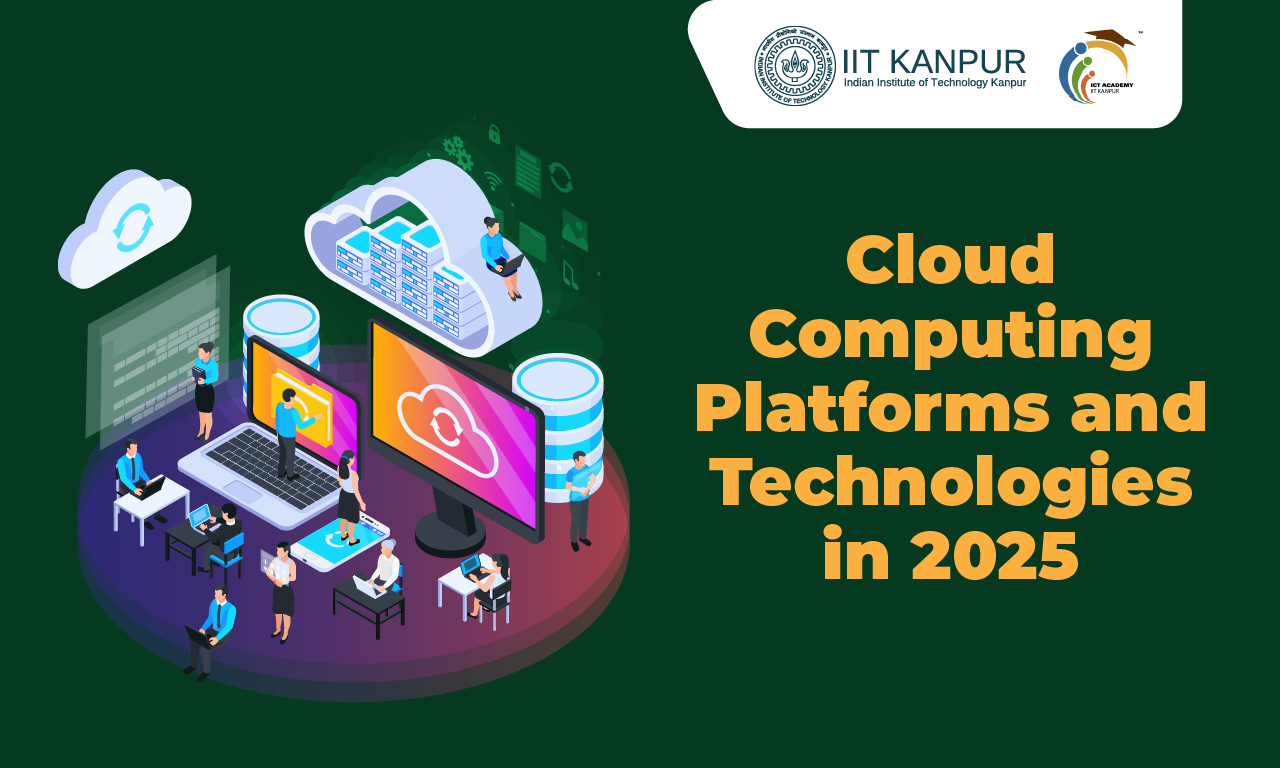Top 5 Cloud Computing Platforms and Technologies in 2026

Top 5 Cloud Computing Platforms: The future of cloud automation is bright as many companies are shifting to cloud computing platforms. The reason is that it offers users the liberty to access any resources (databases, files, servers, or applications) anytime and anywhere.
This shift is not just a trend; it’s a strategic move toward efficiency and flexibility. Even Gartner’s studies show that by 2027, cloud computing will be the key driver for business innovation.
This blog will focus on the top cloud computing platforms and trends in 2026 . Whether you are an individual intending to advance your career or an organization aspiring to adopt a cloud computing platform as their service, this blog is for you. Keep reading till the end to discover valuable insights.
But first, let us start by understanding the cloud computing platform meaning and why it holds such significance in 2026.
Definition of Cloud Computing Platform
A cloud computing platform refers to a suite of services and tools intended for reliable remote access to computing resources through the internet. All services, including storage, compute power, and application hosting, exist on an online platform. So, unlike traditional IT infrastructures, these platforms eliminate the need for physical hardware while offering enhanced scalability, security, and cost efficiency.
Primary features of cloud computing platforms:
- Resource Elasticity: You can adjust resources based on demand.
- Pay-As-You-Go Model: To eliminate infrastructure costs by paying only for what you use.
- Global Accessibility: Access resources from anywhere, facilitating remote work.
Top 5 Cloud Computing Platforms
The following are the top companies dominating the cloud market:
Amazon (AWS)
- AWS is the most popular cloud computing platform by Amazon, with solutions such as storage, analytics, and machine learning.
- It fits businesses of all sizes.
- For example, during the Black Friday sale, an e-commerce company can scale the servers on AWS and run with it.
Google Cloud
- Google Cloud stands out with its data analytics and artificial intelligence capabilities.
- It is the best for companies whose focus is on big data and machine learning projects.
- For example, a healthcare company can utilize the Google Cloud to handle extensive patient datasets and run predictive analytics.
Microsoft Azure
- Azure is a cloud computing platform by Microsoft that was originally launched in February 2010 under the name Windows Azure, only to be rebranded as Microsoft Azure in 2014.
- With its rebirth, it has developed into this varied cloud platform providing suite services, including computing, analytics, storage, and networking.
- It integrates well with Microsoft tools, such as Office 365 and Dynamics.
- It provides enterprise-grade security and advanced AI capabilities.
- For example, an e-commerce business harnesses the power of Microsoft Azure cloud software to scale its servers up or down during peak traffic times like the annual Black Friday sale.
- In fact, Zoom uses cloud computing by Azure for seamless video conferencing experiences.
Salesforce
- Salesforce is an eminent company providing cloud solutions.
- The cloud platform Salesforce is focused on automating sales, marketing, and the whole customer support using Sales Cloud, Marketing Cloud, Service Cloud, etc.
- Example: A retail business can use Salesforce to personalize customer interactions and improve retention.
IBM Cloud
- Focuses on enterprise-level solutions with robust hybrid cloud services.
- Ideal for businesses requiring customizable and secure cloud environments.
- Example: Financial institutions use IBM Cloud for secure data storage and blockchain-based transactions.
Comparing Top 3 Cloud Computing Platforms
Google, Amazon, and Azure are the major cloud companies that are leading the market. This cloud computing platform comparison will help businesses choose the right solution based on their needs.
| Features | AWS | Azure | Google Cloud |
|---|---|---|---|
| Pricing | Pay-as-you-go, tiered rates | Enterprise-friendly packages | Flexible pricing models |
| Scalability | Highly scalable | Seamless integration | Auto-scaling capabilities |
| Security | Advanced encryption | Built-in security tools | Secure by design |
| User-friendliness | Developer-centric | Business-centric | Data-driven approach |
So, we can conclude that:
- Cloud computing platform by Amazon is ideal for – enterprises & startups.
- Azure is ideal for – enterprises already using Microsoft tools and ecosystem.
- Google Cloud for – Brands focusing on ML/AI integration.
Top 4 Cloud Computing Technologies in 2026
The future of cloud computing platforms is closely bound to emerging technologies that promise to redefine their capabilities. Here are some of the hottest trends in cloud computing for 2026:
IoT
IoT (Internet of Things) cloud technology helps to store and analyze the data collected by IoT devices. Now, what are IoT devices? They are everyday devices that generate vast amounts of data. For example, fitness trackers that count your heart rate or daily steps. Then we have smart thermostats for temperature readings and many more such devices.
Now, the data that is generated every minute requires robust cloud computing platforms for processing and storage. Instead of storing all this data on the device itself, it gets sent to the cloud. The cloud can handle all that data to help businesses make quick decisions.
Use case example:
- Smart cities use IoT devices in traffic lights and security cameras. It helps manage public safety by connecting devices through the cloud.
- Companies in the supply chain use GPS-enabled sensors to track shipments and orders in real time.
Edge Computing
- Unlike traditional cloud models, edge computing handles data near its origin.
- This reduces latency and improves performance for applications like autonomous vehicles or real-time gaming.
- In 2026, edge computing complements cloud computing platforms by enabling faster and more reliable data handling. Moreover, the investment by companies in Edge serves will reach $317 billion by 2026.
Real-Life Applications: In industries like healthcare, finance and manufacturing.
AI Integration in Cloud Services
Integrating AI and ML in cloud computing platforms is a great step to:
- Enhance Decision-Making: by providing actionable insights for strategies.
- Automate Workflows: like doing repetitive tasks like report generation or data entry.
- Personalize User Experiences: by predicting customer preferences and tailoring services in real time.
Quantum Computing as a Service
Another exciting development on the horizon is the expansion of Quantum Computing as a Service (QaaS). It is a model that allows businesses and individuals to access quantum computing power over the internet. With Qaas you can perform tasks like optimization problems, drug discovery, and cryptography without needing to own expensive hardware.
By 2026, quantum computing will transition from research labs to practical applications across various industries like:
- Software Development: Companies use QAAS to test applications for bugs.
- Manufacturing: To test product quality.
- Healthcare: QAAS can help healthcare providers maintain quality in patient care, managing compliance with drugs and medicines for patient safety.
- Food & Beverage Industries: To maintain health standards and product quality.
Conclusion
As we look toward 2026, the role of cloud computing platforms in driving business innovation and transformation is undeniable. Companies adopting these cloud computing platform as a service benefit from:
- Operational Efficiency: Reduced IT overhead and improved resource management.
- Innovation Opportunities: Access to advanced tools like AI and machine learning.
- Global Collaboration: Seamless interaction across geographically dispersed teams.
At E&ICTA Consortium, we offer industry-relevant cloud computing courses to help learners stay ahead in their careers. Our most selling courses are:
What’s the wait for? Enroll now.
Recommended Courses

Introduction to Cloud Security

Professional Certificate Program in Cloud Computing & DevOps



